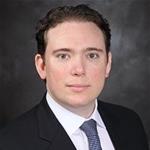- Wintrust’s Jason LeuVoy Taking on Expanded Role Following Retirement of John Marrinson
- SFNet Committee Spotlight: Emerging Leaders Committee
- Fraud Prevention and Resilience in Secured Finance: Highlights of SFNet’s Fraud Task Force White Paper
- SixCap Healthcare Finance Launches Integrated Healthcare Capital Platform Combining Asset-Based Lending and Real Estate
- The Power of Mentorship: A Conversation with Frank Grimaldi
The Importance of Stretching
March 7, 2019
By Christopher Ross
Every personal trainer and athletic coach I have ever worked with has stressed the importance of stretching. When working out or playing sports, stretching your muscles prevents against injury and helps you outplay the opposing team. Young professionals would do well to keep the same advice in mind when approaching their careers. This is particularly true in the area of finance, where understanding and reconciling the perspectives of many different stakeholders is necessary to accomplish the shared goal of a successful transaction.
In the professional context, stretching can have several different meanings. One way to stretch is to push yourself to achieve a more ambitious objective than you have previously attempted. As an attorney, I am most familiar with the apprenticeship model of professional development. In our industry, junior lawyers work under (and learn from) more senior lawyers in the context of a live deal. I always advise my younger colleagues that those who reach for more advanced assignments are usually recognized for their efforts to improve their skills and add greater value to project. Most senior attorneys will understand that a junior lawyer who tries to take on more difficult tasks is unlikely to deliver flawless work product from the outset, and must be willing to help an aspiring practitioner learn from his or her mistakes. As this cycle becomes self-reinforcing, the young professional is able to quickly move into a more advanced role.
Reaching for more advanced assignments carries with it risks as well as opportunities (including occasions for more stretching). One of the most challenging periods in my career so far was when I was a mid-level attorney (about three to six years after I began my practice). At this point, I was responsible for my own assignments as well as supervising a junior associate’s work product. Meanwhile, I was constantly seeking out more challenging tasks in order to advance my skill set and broaden my experience. Covering all three positions left me feeling pretty stretched. However, this exercise ultimately helped me learn how to be flexible and better prioritize my obligations. In that way, extending myself to be responsible for more aspects of my deals allowed me to become a more flexible thinker, a more efficient project manager and, ultimately, a more effective attorney.
As someone who has only tried yoga a handful of times, I can attest that stretching can really take you out of your comfort zone. I have found the same is true in my career. For example: after I had been a practicing finance lawyer for about five years, I was asked to help a client purchase a private aircraft. As I began to ask questions about the debt financing I quickly learned that the client intended to pay the purchase price with cash on hand. I was confused why I was selected for this deal, given that I seemingly would not be able to apply my experience as a finance attorney to the matter, but pushed ahead anyway. When the transaction was successfully concluded, I asked the partner on the deal why he had chosen me to advise the client even though I did not have directly applicable experience (and no significant prior experience with aircraft, which are highly regulated). The partner simply said that he staffed me because he thought I would be able to figure it out. Though I have not worked on a similar deal since, I learned several valuable lessons from the experience. Shifting my perspective from finance to M&A, and layering on top of that the unfamiliar subjects of aircraft regulation and the tax treatment of common carriers, taught me to be more flexible and nimble in my thinking and drafting. I also learned better how to efficiently solicit and quickly download the information I needed regarding these new subject matters so that I could properly advise my client. For the same reasons, young professionals in the finance arena often benefit from taking opportunities to perform outside their regular workspace. It is no mistake that many large financial institutions encourage employees to try several different job functions, from field examiner, to underwriter to business originator. Though it may be uncomfortable to try something new when you previously have been focused on building expertise in a particular area, expanding your experiences in this way can help develop a more holistic view of your business and a more creative and flexible mindset when approaching your work and career.



.jpg?sfvrsn=f1093d2a_0)
